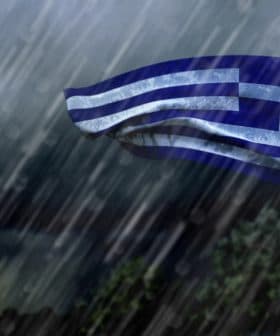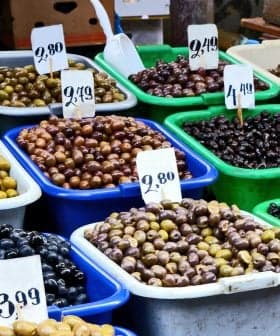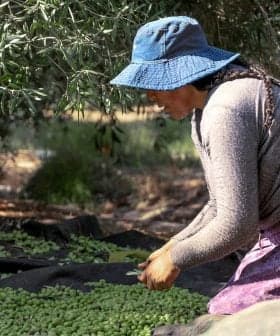Greece Registers Four PDO and PGI Olive Oils as Intellectual Property
The Greek extra virgin olive oils were registered with an international organization that protects the product from imitation and counterfeiters in 56 countries.
 Koroneiki olives
Koroneiki olives 5.0K reads
5.0K readsFour Greek extra virgin olive oils with protected geographical indicators from the European Union have been registered with the World Intellectual Property Organization (WIPO) to protect them from counterfeiting. The WIPO registration provides robust protection for the oils, and the Greek olive oil industry believes that more extra virgin olive oils will be registered in the future to ensure the widest protection possible for foods of excellence.
Four Greek extra virgin olive oils with protected geographical indicators from the European Union have received international intellectual property protection.
Kalamata PDO, Sitia Lasithiou Crete PDO, Kolymvari Chania Crete PDO and Lakonia PGI have been registered with the World Intellectual Property Organization (WIPO).
This legal commitment taken by the contracting parties, most of them not belonging in the E.U., means that PDO and PGI products are under a tough system of protection even outside the E.U.
Protected Designation of Origins (PDO) and Protected Geographical Indications (PGI) are two European Union-wide certifications that protect traditionally-produced specialties from particular regions.
According to Sevitel, the association of the Greek olive oil industry, which was the driving force behind the initiative, the WIPO umbrella will further protect the oils from counterfeiting, imitation and other uncompetitive practices.
See Also:Pressure Mounts in Greece to Settle Dispute Over Kalamata Appellation“Once they have been registered by WIPO, PDO and PGI products are fully protected by all contracting parties, covering up to 56 countries,” George Okinomou, Sevitel’s general director, and Vasiliki Bakali, Sevitel’s lawyer, told Olive Oil Times.
“Contracting parties to the Geneva Act [which allows the international registration of geographical indications] must provide legal means to prevent the use of an internationally registered appellation of origin or geographical indication in respect of goods of the same kind, or goods that are not of the same kind,” they added.
“They must also provide legal means to prevent any use amounting to the imitation of an appellation of origin or geographical indication,” Okinomou and Bakali continued.
Preventing the counterfeiting of PDO and PGI products is a global challenge, and European and international institutions routinely prosecute offenders.
An anti-fraud operation led by Europol and Interpol in 57 countries in 2016 uncovered more than 11,000 tons of counterfeit goods, including large quantities of oil, labeled as “extra virgin,” which had been intentionally mislabeled or adulterated to appear genuine.
In 2018, a similar investigation in 36 countries on four continents dismantled entire networks of counterfeit goods production. In that same year, another international operation uncovered almost 10,000 tons of counterfeit products in 61 countries, including a large volume of olive oil.
According to the Italian government, counterfeit foods are smuggled globally by modifying the original contents of food or by marketing products whose appearance closely resembles the authentic certified products, with names and titles that might appear legitimate.
The Italian farmers association, Coldiretti, estimates the global market’s value for counterfeit Italian food at €100 billion.
“This legal commitment taken by the contracting parties, most of them not belonging in the E.U., means that PDO and PGI products are under a tough system of protection even outside the E.U.,” Oikonomou and Bakali said. “If not protected, the value of such products can be eroded and consumers short-changed.”
The need for such improved protection is enhanced by the critical role of PDO and PGI products for the Greek economy and in the country’s renowned food production traditions.
According to the Greek Ministry of Rural Development and Food, 31 Greek extra virgin olive oils have PDO or PGI certifications.
“PDOs and PGIs are worth protecting not only because of their connection to quality, tradition and reputation; they also make a very valuable contribution to sustainable rural development,” Oikonomou and Bakali said.
“In fact, for the producers, the exclusive right to use a product name leads to a higher price than for similar products in the same food category,” they added.
According to Oikonomou and Bakali, the European Union “has been doing great work through the years to establish both a system of effective processes to recognize and protect local products and promote them in third countries.”
“Were it not for the coordinated acts of the E.U., we might not speak now about PDO or PGI products,” they added.
The WIPO registration provides more robust protection and emphasizes how other international institutions are lacking action, added the Greek experts.
“The global market is a very complex field where the competition of very different and contradicting interests on the one hand and the different legal backgrounds, on the other hand, must be weighed through diplomacy to end up with sustainable solutions,” Oikonomou said.
“The protection given to geographical indications at the international level is considerably enhanced by the TRIPS Agreement,” he added. “However, I think that within the World Trade Organization, we need tougher rules to protect quality and regional products.”
According to Oikonomou and Bakali, the WIPO registration for the four Greek PDO extra virgin olive oils is only the beginning.
“We think the importance of ensuring the widest protection possible to foods of excellence will push the other olive oil-producing countries to follow the same path,” they said. “Italy in 2014 was the first country that applied for the protection of E.U.-certified extra virgin olive oils, with Sabina, Dauno, Terre di Siena and Terra d’Otranto.”
The WIPO registration process for the Greek extra virgin olive oils did not represent a hurdle, Oikonomou and Bakali added.
“Both the European Commission and the Greek authorities gave us all the necessary information and guidance to achieve the protection of the olive oils within the Lisbon System [the E.U. treaty which includes denomination of origin and their international registration],” they said.
“We submitted to the Greek authorities an application along with the product specifications in English, and the rest was undertaken by both the Greek authorities and the commission,” Oikonomou and Bakali added. “It was neither a complicated nor a long process.”
“We believe, given the success of the project, that more extra virgin olive oils will be registered in the months to come,” they concluded.









